A report by European Democracy Consulting highlights the failures of the European party watchdog to implement its transparency requirements under EU law. European Democracy Consulting lodged a complaint to the European Ombudsman on 26 June.
On 26 June, European Democracy Consulting lodged an official complaint to the Office of the European Ombudsman in relation to the failure of the Authority for European Political Parties and European Political Foundations (APPF) to implement its transparency requirements under EU Regulation 1141/2014 on the statute and funding of European political parties and European political foundations.
What is the APPF?
The 2014 EU Regulation created the APPF “for the purpose of registering, controlling and imposing sanctions on European political parties and European political foundations.” In simple terms, the APPF is therefore the EU’s party monitoring body and watchdog, like many similar bodies at the national level.
The Regulation also establishes clear and precise transparency requirements binding upon the APPF, the European Parliament, and European parties and foundations. These requirements aim at ensuring that European citizens and media would have the means to know, engage with, and monitor European parties and their foundations.
In particular, the Regulation requires certain information about European political parties and foundations to be provided on a single website. This includes, among others, information about sums received, financial statements, work programmes, the name of donors and the value of their donations under certain conditions, sanctions against parties, and lists of member MEPs.
What is this complaint about?
Following work on the reform of European political parties, European Democracy Consulting has come to the conclusion that the APPF had consistently failed to meet both the letter and the spirit of these requirements. When assessed against elements listed in the Regulation, the information published by the APPF is gravely lacking.
In particular, some information is only located on the European Parliament’s website (such as amounts paid to European political parties and foundations) despite the requirement that all information be on the same website. Further information is not up-to-date (e.g. the mentioned list of donations and contributions for financial year 2018 should have been published in 2019, preferably ahead of the European elections), not in line with the Regulation’s requirements (e.g. donations and contributions do not always match the required thresholds), or is missing entirely (e.g. there is no information concerning the imposition or absence of sanctions, no single list of MEPs and their membership of European parties, and no list of contributions from legal entities members of European parties and foundations).
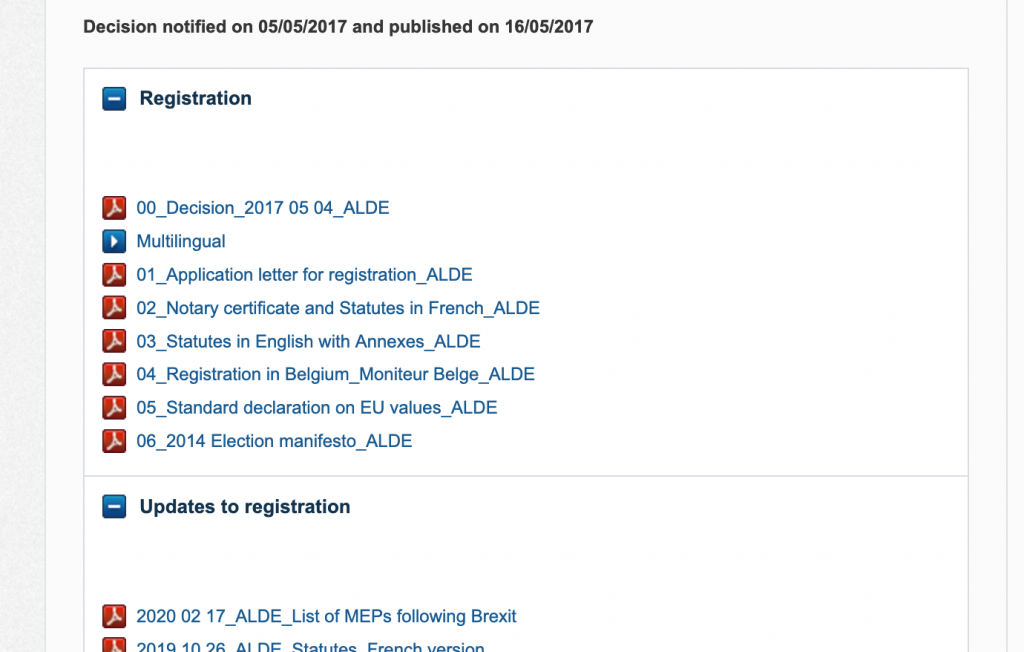
More generally, the information provided is often published “as is” from what European parties and foundations have sent to the APPF, meaning they are in separate PDF files, often from scanned documents. The APPF does not consolidate any of the information it provides, which would allow for comparisons and analysis, and no data is provided in machine-readable formats. As a result, the information available falls far short of any standard of visibility, clarity and user-friendliness.
Why should we care?
When requesting some information to be consolidated on a single website and made public, the European legislator recognised the importance of transparency and enshrined the need for the public visibility of European parties and foundations. The APPF has continuously failed to ensure this visibility.
This continued lack of public information, the incompleteness of this information, the way it is displayed, and the multiplicity of locations where it is stored are particularly damaging for citizens’ proper understanding and knowledge of European political parties.
This is especially important at the European level, where the absence of a political union means that European citizens only have a limited familiarity with European parties. As a result, the lack of a minimum visibility for European parties guaranteed by the APPF has a direct impact on citizens’ informed choice-making ahead of European elections.
Why does European Democracy Consulting care?
We care about the role of the APPF because we care about European democracy.
European Democracy Consulting was set up with the goal of supporting a more democratic, transparency and efficient Union for the benefit of all European citizens. Despite their lack of public support in recent decades, we consider political parties an essential component of representative democracy.
Likewise, the European Union and its citizens stand to gain from stronger, more affirmed, and more visible European parties with a closer link to the citizens they seek to represent. This starts with citizens knowing their parties and with public entities ensuring needed transparency, above and beyond legal requirements.
Why lodge a complaint with the European Ombudsman?
The European Ombudsman works to promote good administration at EU level, including by investigating complaints about maladministration by EU institutions and bodies. As an EU body with its own legal personality, the APPF is therefore under the remit of the European Ombudsman for its failures to fulfil its mission.
In practice, the Office of the European Ombudsman requires plaintiffs to wait for “a reasonable time” before lodging a complaint. On 26 March, European Democracy Consulting notified the APPF of its findings and its intend to lodge a complaint within three months, should no remedial action be taken.
As a gesture of goodwill, European Democracy Consulting provided the APPF with a full analysis of its perceived shortcomings, a detailed report on the 2019 European elections, including electoral data from all Member States. In early April, the APPF acknowledged receipt of our notification and responded with justifications of its on-going practices; we argued back that these practices were not in line with their legal requirements. Three months later, the APPF has failed to take any remedial action to abide by its transparency requirements.
What should the APPF do to comply with its requirements?
Based on the shortcomings identified above, both from the point of view of explicit legal requirements and of basic considerations for citizens’ experience in accessing this information, we make the following recommendations.
- Consolidate all information on a single website. The Regulation is very clear in its requirements that all the information it lists are to be on a single website and, from a citizen’s perspective, this requirements is very understandable. The APPF should therefore ensure that the entirety of the information listed is available in a single location.
- Ensure the information provided is complete and matches the requirements. The APPF provides information related to donations; however, the information is incomplete and is provided in categories that do not match the Regulation’s requirements, making it difficult to understand whether or not it is complete.
- Ensure the absence of information is not confused with missing information. The APPF’s website has no information on sanctions applied to European parties or foundations. In the absence of any information on this topic, there is no way to know whether sanctions have never been applied or whether information on sanctions is simply missing.
- Ensure the information provided is up-to-date and consistently provided. Financial statements and audit reports are only provided until 2017, and technical information provided by the European Parliament until 2018. Conversely, there is no information on donations before 2018.
- Ensure the information provided is clear and understandable. For the sake of clarity, financial information must be disaggregated. For instance, when indicating the funding made available to European parties and foundations, it is essential to indicate how much (in euros, not percentage) stems from the lump sum amount given equally to all parties, and how much comes from the MEP-based allocation and for which number of MEPs per European party.
- Ensure the information provided is in machine-readable formats. In order to allow the press, social scientists and European citizens to carry out their work of analysis and vigilance and hold political stakeholders accountable, the data provided must be available in a clear fashion. In particular, the APPF must go beyond merely publishing documents received from European parties and create its own database including information on parties’ funding, their legal and natural members, informations on MEPs including their national parties and political groups of affiliation, etc. This information must be available online and exportable to machine-readable format.
- Go beyond the Regulation’s requirements. For the proper understanding of European parties, in particular, and of their role in the European political system, more information is needed and ought to be provided on the APPF’s website. The European Parliament’s website can be a source of inspiration, as it strives to display electoral data at the EU level and broken down by Member State in an interactive and clearly understandable manner.
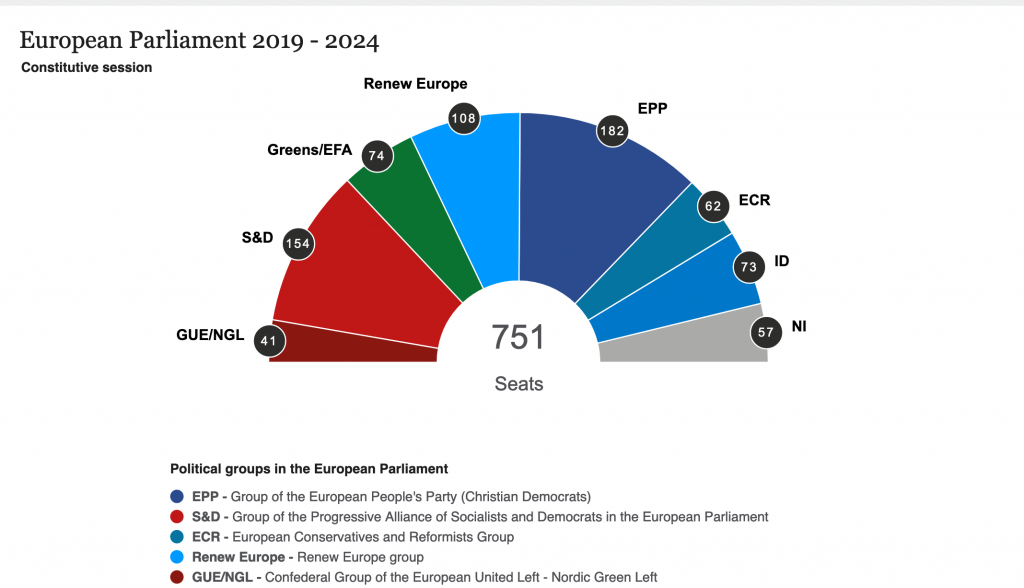
For more information, please consult our dedicated report.
What happens now?
On 26 June, we officially lodged our complaint to the European Ombudsman, providing all elements in our analysis and our correspondence with the APPF. European Democracy Consulting hopes the European Ombudsman will ensure the respect of essential transparency criteria, including ensuring the centralisation, completeness and regular update of required information, as well as the provision of relevant data in a clear, user-friendly and machine-readable format for the benefit of a watchful media, social scientists, and European citizens.
The APPF is strongly encouraged to go beyond minimum disclosure requirements and ensure the true public visibility of European parties in order to strengthen the link between European citizens and their political representatives. Understandably, this may require more time to implement, but is essential to the good information of European citizens. As we have with the provision of our data and online report, we stand ready to assist the APPF in this effort.
European Democracy Consulting is a consulting firm set up following the 2019 European elections and born from the desire to improve our European democracy. It supports decision-makers, public institutions, and NGOs in their promotion of a more democratic, transparent and efficient Union.
For more information: contact@eudemocracy.eu
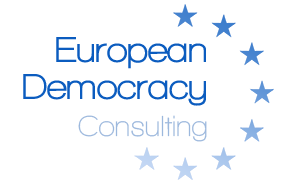
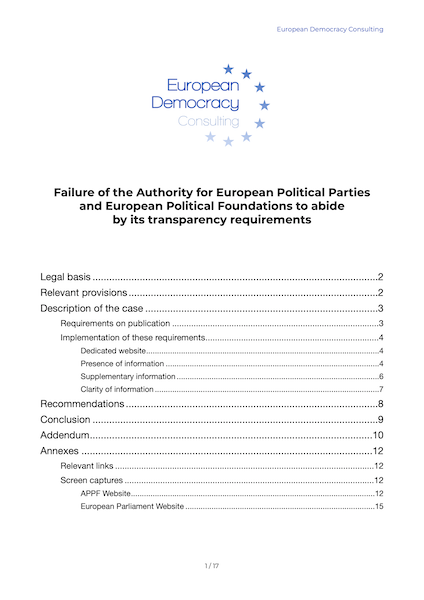
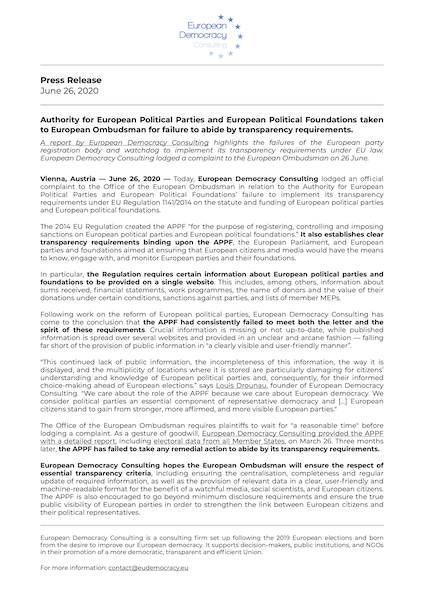
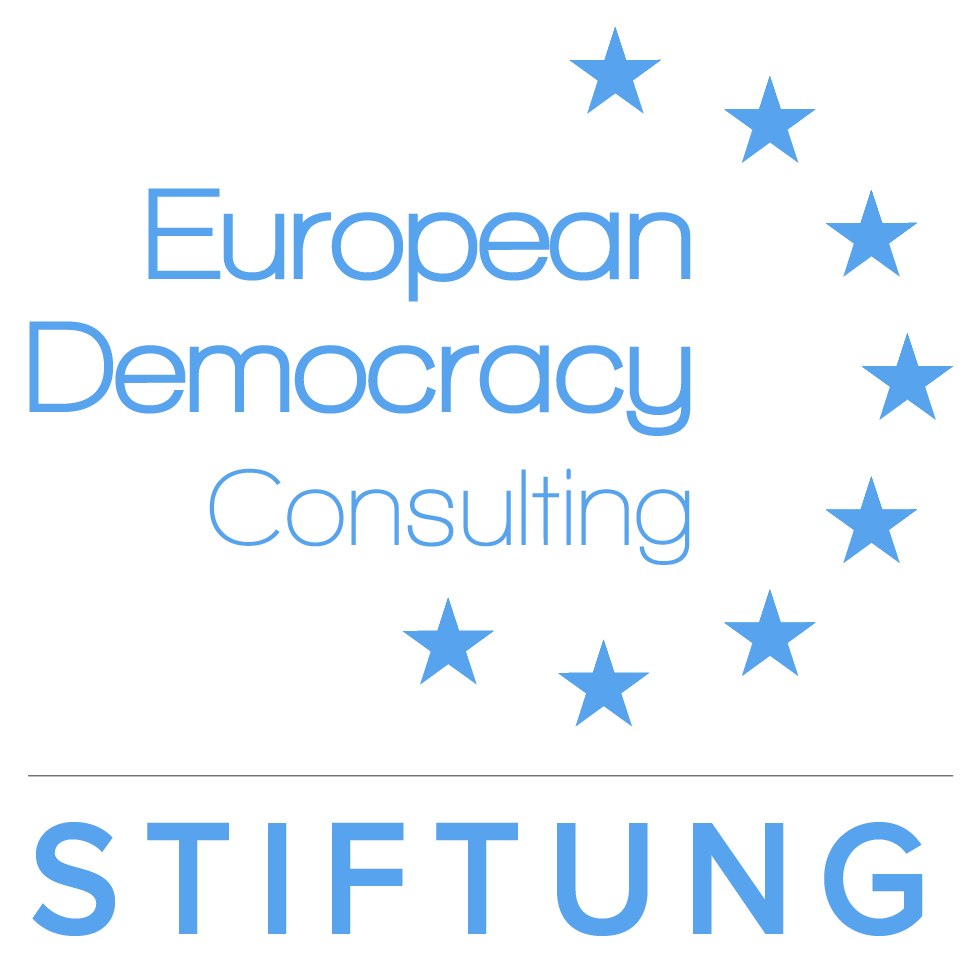
Pingback: EU Ombudsman opens APPF inquiry – European Democracy Consulting
Pingback: EDC comments EU parties watchdog reply to EU Ombudsman inquiry
Pingback: EDC responds to Ombudsman decision on Authority for European Parties